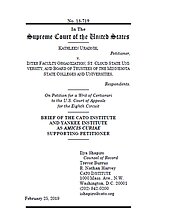Learn more about Cato’s Amicus Briefs Program.
Under Minnesota law, public employees are compelled to associate with and speak through a state-designated labor union for collective bargaining and other related purposes. Under these so-called “exclusive representation” schemes, state-designated unions are recognized as public employees’ sole representative and have the exclusive right to speak on their behalf. Kathleen Uradnik is a professor of political science at St. Cloud State University in Minnesota, and she chose not to join her designated union, the Inter Faculty Organization (IFO). Professor Uradnik strongly opposes the union speaking on her behalf yet is still forced to accept the union as her representative.
The Supreme Court recently recognized in Janus v. AFSCME that exclusive representation inflicts a “significant impingement on associational freedoms that would not be tolerated in other contexts.” After all, exclusive representation creates an unwelcome agency relationship between the union and dissenting nonmembers. The union is essentially granted a monopoly on all work-related expressive association, meaning employees can’t forgo union representation or choose another representative. And exclusive representative status means that any position the union takes during collective bargaining is imputed to all the bargaining unit employees, including those who disagree with its positions. Professor Uradnik opposes many positions the IFO has taken on issues involving “wages, hours, and conditions of employment,” “the cutting of academic programs,” and other matters involving job seniority. The IFO has even spoken out on controversial political matters, including issuing endorsements for public office and lobbying the state on various policy issues. And because unions with exclusive representative status negotiate one-size-fits-all contracts for all employees, they deny employees a chance to negotiate directly with their employer to develop contracts that fit their individual situations.
The Supreme Court has long recognized that freedom of association presupposes a freedom not to associate. Yet, in the labor context, the courts have been reluctant to subject public unions to any degree of constitutional scrutiny because of states’ purported interest in promoting “labor peace.” But whatever may have been the case in the early days of the labor movement, “labor peace” can now be achieved through means significantly less restrictive of associational freedoms. Exclusive representation simply can’t be justified by any state interest, let alone a compelling one, that might validate the serious impingements it imposes on dissenting nonmembers’ associational rights. Put plainly, there is no labor law exception to the First Amendment, and labor laws that violate constitutional principles must be held to heightened judicial scrutiny.
Professor Uradnik lost in the court of appeals. Now on petition to the Supreme Court, the Cato Institute and the Yankee Institute have filed a brief in support of Professor Uradnik’s petition, arguing that exclusive representation regimes like Minnesota’s are unconstitutional violations of union nonmembers’ associational and free speech rights. The Court has a chance to finally set the record straight by reaffirming associational rights in the labor context and clarify once and for all that public employees don’t leave their constitutional rights at the workplace door.

This work is licensed under a Creative Commons Attribution-NonCommercial-ShareAlike 4.0 International License.
